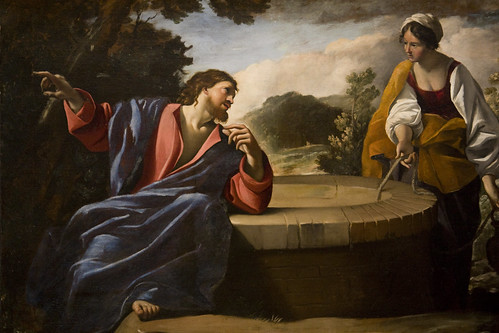 There is something familiar, almost tragic in the life this woman whom Christ encountered at Jacob’s Well. We could called her the Woman in the Well. Why? She had been married five times before and the sixth man she was with has left her empty and disappointed. What better describes her predicament than a well—a dark hole of incomprehensibility, of meaninglessness? St Augustine likened her condition to that of sin; the sixth man representing sin which only left her dissatisfied. Some of us may be living in wells even if we are not conscious of them; driven in despair or despondency to search for fulfilment in wrong peoples and places. Sounds familiar?
There is something familiar, almost tragic in the life this woman whom Christ encountered at Jacob’s Well. We could called her the Woman in the Well. Why? She had been married five times before and the sixth man she was with has left her empty and disappointed. What better describes her predicament than a well—a dark hole of incomprehensibility, of meaninglessness? St Augustine likened her condition to that of sin; the sixth man representing sin which only left her dissatisfied. Some of us may be living in wells even if we are not conscious of them; driven in despair or despondency to search for fulfilment in wrong peoples and places. Sounds familiar?At the centre of today’s Gospel was a woman’s search and how an encounter with Christ led to her freedom from sin. A few scriptural facts may help us appreciate this encounter. First, Christ seemed out of touch with the reality that His people and the Samaritans did not always see eye to eye. There existed a wall of prejudices between these two groups of people. Second, social convention had already condemned this Samaritan to invisibility. She had to come to the well at an hour where people generally did not. Third, this was the longest conversation recorded in the four Gospels. The disciples may have been scandalised by His behaviour judging by their surprise.
The encounter was not a case of Christ deliberately over-turning social taboos. Instead, Christ broke barriers indicating that no human condition is outside the purview of His salvation. The conversation began simply with the reality of physical thirst that subsequently led to a fulfilment of her spiritual search. In the course of the dialogue, she told him, and we know it was lie, that she did not have a husband. There seemed to be a play between the numbers six and seven; with six indicating incompleteness and seven signifying perfection. Sin can never fulfil us no matter how promising. In her state of sinfulness, one can say that Christ came into her life as the “seventh” man. In meeting this seventh man and opening up to Him, she found what she had always been longing for.
We can surmise that she longed for the completion which only God can give—and not sin. St Augustine aptly described this craving as a restless heart searching for God. In a sense, she typified the search of every human heart. In searching, we often think in terms of objects or goals—money, fame, recognition, people and even God. But, our searching, at the same time, reveals what we truly need and who we really are—we long to be known, to be accepted and to be loved. To be known, accepted and loved are expressions of the search for who we are truly and what makes us whole.
Unfortunately, the prevailing wisdom has narrowed our search for who we are truly and what makes us whole to self-esteem, self-love and self-fulfilment—a need to be recognised, to be accepted and to be remembered. Christ is the only one who can fulfil this search. He is the only mirror that can reflect our true self to us. In this respect, Lent’s penitence is a potent path to this encounter with Christ. We deny ourselves of food and creaturely comfort to quieten our distractions. We intensify our prayers in order to strip away any vestiges of resistance to Christ and we amplify our charity so that we can meet Christ in His brothers and sisters.
We can appreciate the connexion between sin and the search for who we truly are. The woman in the well symbolises the slavery of sin and the search for freedom from sin’s slavery represents the desire to be who we truly are. This is the irony of it all. Our search does not end when we have discovered Christ. Here, the statement does not mean that Christ does not fulfil us. Instead our search does not end with Christ because it continues with Him. This is important as we can glean from the stages that Christ led the Samaritan woman through. Have you ever felt that there was a time when you were closer to God and now you no longer feel Him? That is what I mean when our search has somewhat “stopped”. We associate the time and space which we had as definitive of our relationship with Christ our Lord. For example, the high or the ecstasy after baptism or a retreat. Just like the 1st Reading: The Israelites wanted to return to the “sin” of Egypt only because of its familiarity.
Our search continues with Christ entails that we journey with Him into the deserts, up the mountains, down the valleys and into the plains. Saying that our search does not end when we have discovered Christ means that once we have discovered Him, where He is, there we want to be too. This mean discipleship—one who follows closely and intimately. Thus, the woman at the well is really a story of discipleship. She represents the meaning of Christian conversion. Conversion is not simply shrugging off sin. It is also discipleship. After her conversion, she became the Good News to her people.
